Staying Ahead of PTSD: Finding Support Groups or Networks

Violeta lived through the Bosnian War. Though she and her family survived the three-year genocide, she now suffers from post-traumatic stress disorder. And because PTSD is a condition that leaves us open to stimuli, and sometimes very sensitive to common or otherwise routine aspects of life, she has recognized that it is important–after seeking help at a professional treatment center–to maintain a healthy, constructive outlook on life. A major part of that outlook can depend on the quality of your support network.
“It is important to remember it’s not your fault,” Violeta said. “These are things like physical and sexual abuse, and war-related trauma. You have to remember that you couldn’t control everything–and you might even slip up in your own thinking later–which is not your fault either. That is why it is good to have a support network, to remind you of these things after leaving treatment.” An invaluable aspect of the Bridges to Recovery program is helping people identify, use, and sustain a support network, during and after treatment, that is responsive to their needs and gives them opportunities to continue the growth that occurs during their stay.
This network does not necessarily have to resemble what we commonly think of when we hear the words “support group.” Many support groups are as we’d imagine–a circle of people talking out their problems. These are usually conducted in the company of a mental health professional, and are very helpful. They also play an indispensable role in life after leaving a residential treatment center. But there are many different kinds of “support groups” out there that need not be so formal, and still offer great outlets for exploring ourselves and putting what is learned through treatment into practice.
“It was important to me to feel like I was not alone in my disorder,” Violeta said. “I knew that I wasn’t, but seeing and talking with others helped in ways I did not predict. Hearing their stories, especially their insights, helped so much.”
Online Support Groups
A 2004 study of online social support groups showed more than half the people participating in various groups were able to communicate more candidly, and better identify with each other, because communicating online offers a certain degree of anonymity. “Two dimensions further illustrated the advantage of anonymity,” the article states. “(a) easier to relate online anonymously, and (b) anonymity fosters a nonjudgmental atmosphere online.”
Personalization of the online support group experience was also beneficial to their subjects; the study quoted another individual who mentioned the benefits of “lurking,” or hanging back from the discussion and simply reading. There is a lot to be learned by simply watching. Even without commenting, we participate in online discussions by witnessing them unfold. We can witness others’ journeys, and find comfort in shared experiences and success stories. Each new discussion is an opportunity to experience different perspectives, even if you’re only reading. Whether lurking or sharing, however, you get to decide when and how you participate.
And that’s the real advantage to online support groups, especially for someone coming out of treatment–you have the ability to engage with them at your own pace, as well as controlling what you are willing to share. “You have a long time to warm up and read the posts without anyone knowing you are there,” one subject is quoted as saying. “Then when you are ready, you talk and there is no pressure.” Online groups offer opportunities to move forward in your healing by sharing your story anonymously, without any fear of judgment. You choose the venue, medium, and the message.
Call for a Free Confidential Assessment.
877-727-4343A Variety of Available Forums
The Internet offers literally endless possibilities for interpersonal communication. You might go off on your own and find something totally unique that grabs you and really lets you open up, or you might find value in one of the following sites, a few of the more notable online forums available to people recovering from PTSD:
- After Silence is a carefully guarded forum offering a safe place to share insights and experiences. It is an active, relatively large community dedicated to aiding recovery for survivors of sexual violence.
- MyPTSD Community is more open and has a broader scope, featuring news boards, boards for discussing new research, and a wide variety of sub-forums addressing different aspects of living with PTSD after exiting a treatment facility. You only need an account to post on the forums, but anyone can view them.
- The PTSD subreddit is a small, but active, community-driven effort to help survivors manage PTSD. Their guidelines are the loosest of the four sites listed here, but hostility and medical advice are against the rules, and sensitive content is labeled.
- 7CupsOfTea.com offers a bit more interactivity. Members can talk in group chats while waiting to speak one-on-one with volunteers called listeners. The group chats, while not heavily moderated, are friendly and supportive. Membership is free, and if you sign up to become a member, the site awards badges to encourage healthy participation as you do different things, like engaging in the forums and chatrooms.
Online Support Groups Don’t Replace Therapy
Though online support groups can be extremely advantageous, they are neither a replacement for professional help, nor are their benefits equal to those offered in a residential setting. Treatment which includes one-on-one counseling with a trained professional in addition to group therapy can be tremendously beneficial in the pursuit of a healthier and more conscious perspective.
Bridges to Recovery works with you to set up a support structure and equip you with other self-management tools for returning home, as a way of continuing growth after our immersive treatment program. Upon leaving us, you will benefit from reintegration and relapse prevention assignments, a schedule of future appointments, coordination with family members to ensure supportive aftercare, and assistance in integrating treatment philosophies into your own way of life. We will also help you find a support system that works best for you, allowing you to continue your progress towards recovery.






